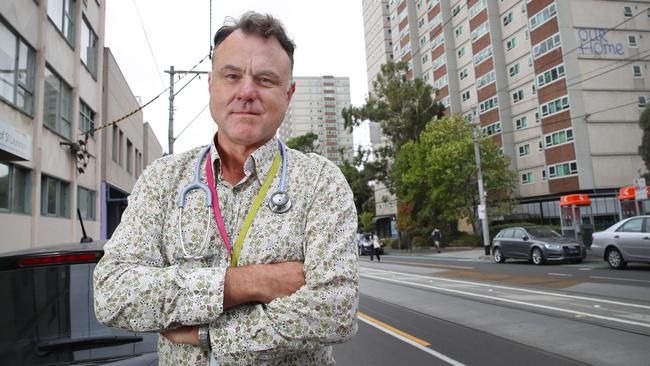Medicare compliance targets altruistic doctors while real fraud goes unchecked
While Medicare is trying to reduce large-scale fraud, the compliance system is targeting doctors who are trying to service the poorest and sickest.

At the foot of the Fitzroy public housing towers in Melbourne, GP John Scopel opens the doors of the community health centre where he practises to all comers.
Come they do, with their unique burdens, among the most disadvantaged people in the country, many homeless, some severely damaged by drugs and alcohol, one an asylum-seeker with such severe depression he is barely verbal.
Dr Scopel, who works at cohealth, a non-profit network of centres that operate with precarious funding, earns a salary at the lower end of the medical profession. The idea he would intentionally defraud Medicare is absurd; he has nothing whatsoever to gain.
“We have an open door to everyone and we bulk bill,” he says. “We try to provide access to people who otherwise wouldn’t receive it.”
Several years ago, he was the target of a Medicare compliance audit. He was frequently using a series of case conferencing Medicare item numbers that others barely used because they are so difficult to understand and navigate, but in so doing, he triggered the algorithm that governs who comes to the attention of health auditors.
The outcomes for patients were brilliant in that the item numbers facilitated multidisciplinary care for complex needs. As far as the auditors were concerned, it amounted to over-servicing or even fraud, and Dr Scopel, after a four to five-year battle, was ordered to pay tens of thousands of dollars in fines.
“We developed an innovative model of creating case conferencing with the patients’ agreement,” Dr Scopel says.
“We have a people-centred approach. There were really good outcomes, much better co-ordination, better efficiency.”
It’s the very model of multidisciplinary care federal Health Minister Mark Butler is seeking to roll out nationwide.
Yet medicos such as Dr Scopel are being punished for billing for this kind of care because Medicare’s compliance system is a blunt instrument that targets GPs servicing the poorest and sickest patients in the country while failing to detect an estimated $1.5bn-$3bn in non-compliance, much of which takes place in other parts of the health system including large public hospitals, radiology and the booming pathology market.
Indeed, state governments for years were the biggest gamers of the system, relentlessly double-dipping by collecting activity-based funding from the commonwealth while claiming Medicare Benefit Schedule items for the same procedure.
“The only widespread systemic attack on Medicare that has been happening was from the states,” says one source who oversaw a crackdown on the practice, which has now been reduced through data matching and the imposition of transparency and value measures in the latest National Health Reform Agreement, recouping an estimated $140m a year.
The difficulty with a commonwealth compliance bureaucracy overseeing state-based public hospitals is obvious, but it is GPs who are largely the targets of what doctors’ groups describe as the “blunt instrument” of Medicare compliance.
Given Dr Scopel’s experience, and those of almost 500 practices trying to carry out multidisciplinary care who received warning “nudge” letters earlier this year for billing consultations involving nurse practitioners that attracts a paltry $12.50 rebate, it’s little wonder Deloitte partner and health economist Pradeep Philip described a “culture of fear” among doctors terrified of facing audits.
The process is so drawn out and brutal that many doctors simply have stopped undertaking complex care that requires frequent long consultations lest they be caught in the algorithm.
The “Ask MBS” system is described as unhelpful and does not provide binding advice doctors can rely on.
Australian Medical Association president Steve Robson says there hasn’t been enough scrutiny on hospitals in the compliance debate.
“Doctors working in hospitals have very little visibility of what is billed in their names,” he says. “The system is totally opaque. Yet at the primary care level, GPs are terrified of the compliance process; they do not want to trigger an audit so they’re pulling up stumps and stopping providing care to the neediest people in the country.
“We need to redesign this system from the ground up.”
Dr Philip also wants a complete overhaul of the system so that it is subject to live, continuous monitoring as is standard in large commercial organisations such as banks. He says currently there is a critical lack of scrutiny and “no meaningful way of education and re-education feedback loops” to assist doctors to correctly bill, leaving “the gate wide open to fraud”.
“You want the system to support clinical judgment, not the other way around,” Dr Philip says.
“You also want to shift the system away from post-payment to pre-claim and pre-payment, and use technology to help providers make the right decision quickly and have peace of mind, so you’re shifting the system to prevention of errors.”
Errors and confusion amid a sclerotic system made up of 6000 MBS item numbers were at the heart of Margaret Faux’s thesis that posited that billions of Medicare dollars were bleeding from the system every year.
There is also a large amount of over-servicing and low-value care.
What there isn’t is a significant pattern of deliberately fraudulent behaviour by doctors on a massive scale. Not least those like Dr Scopel. “I was targeted solely because I fell outside the bell curve,” he says. “ I had no financial incentive at all – I was salaried or doing volunteer work.
“I’m a GP, we’re solutions-focused. We help keep people out of hospital, out of prison. We help people avoid needing court involvement. We keep people alive. We help keep people from needing Child Protection.
“It’s complex work but we play the long game and achieve good results.”



